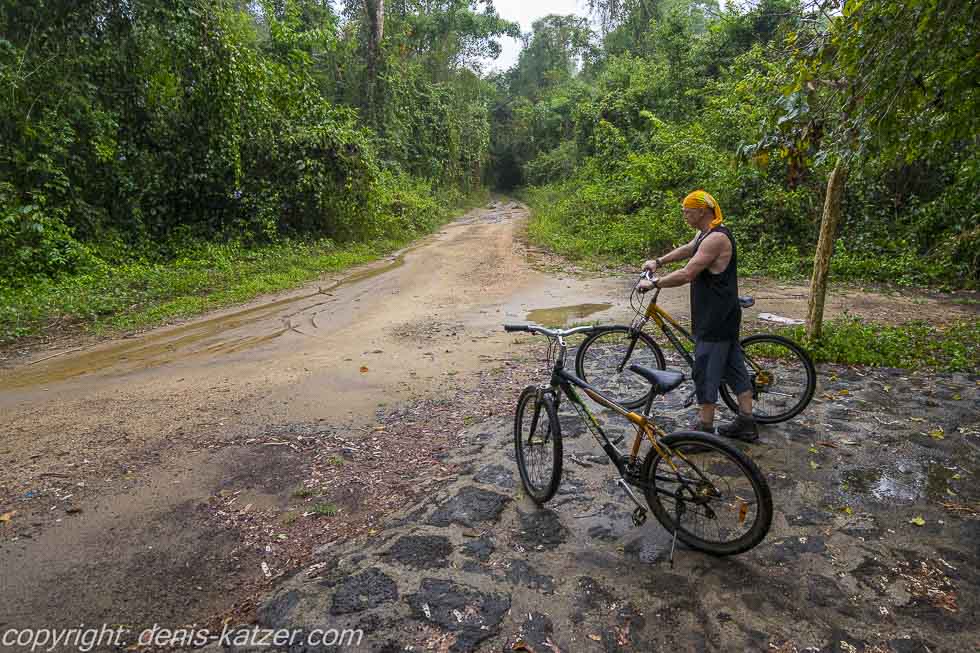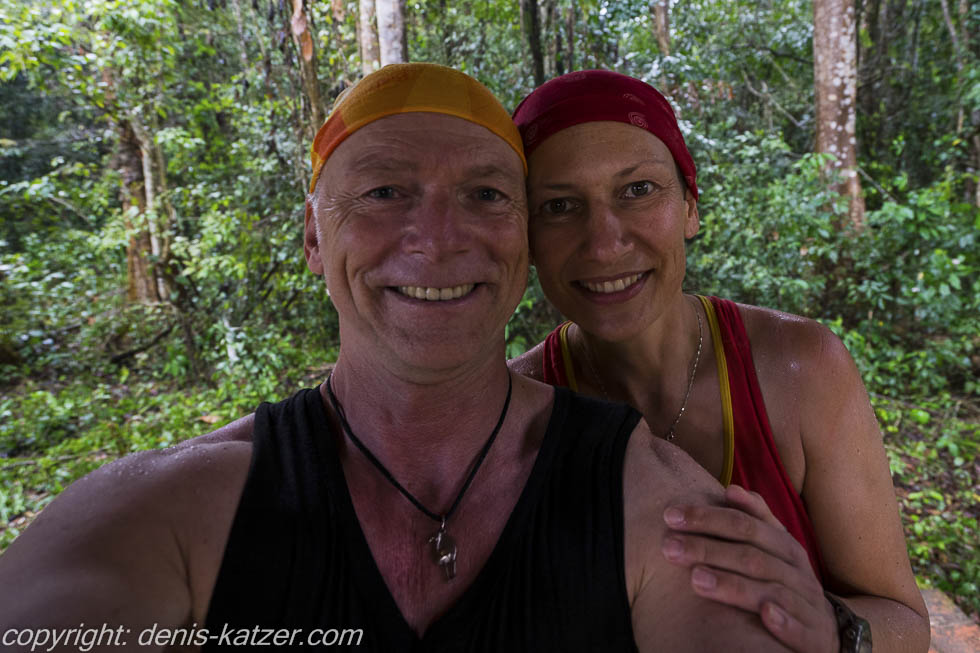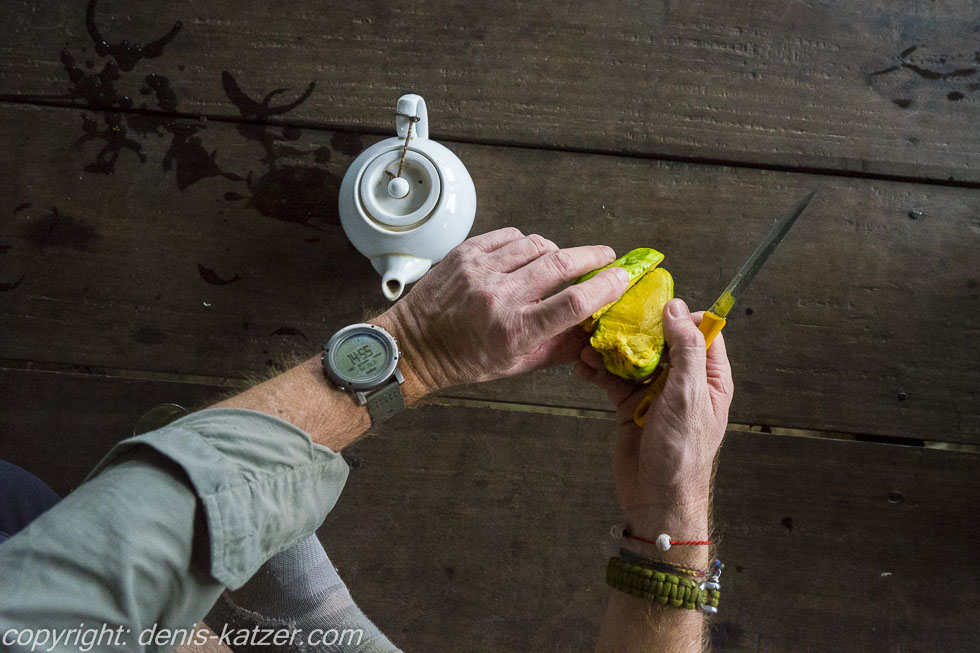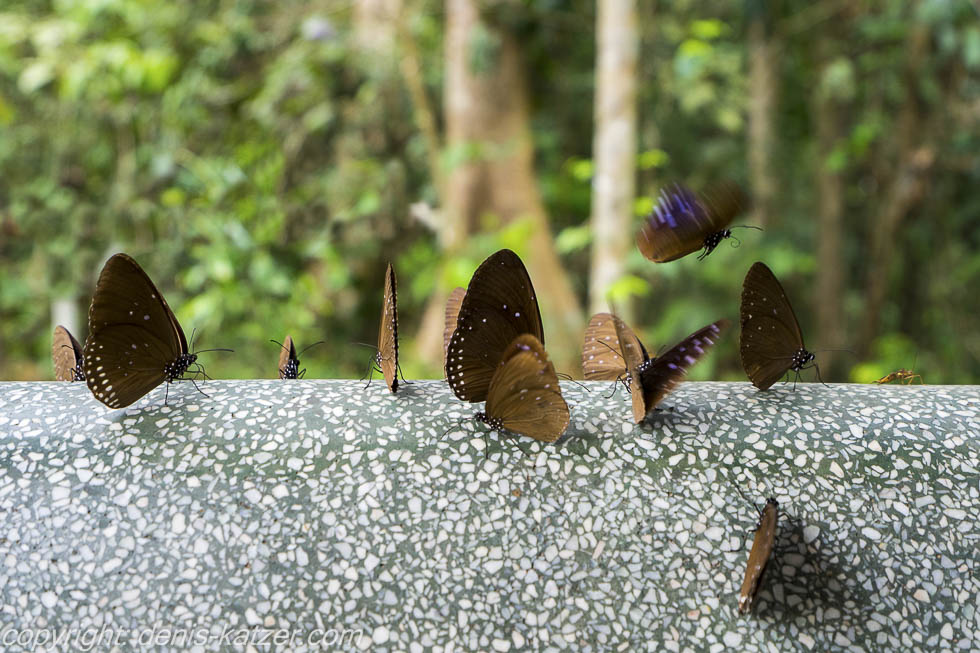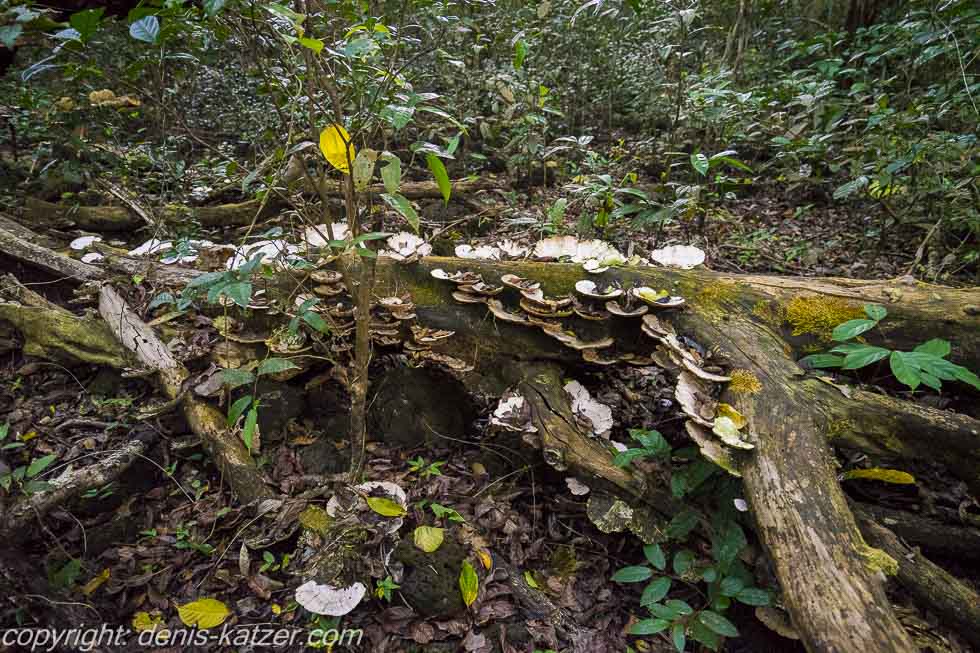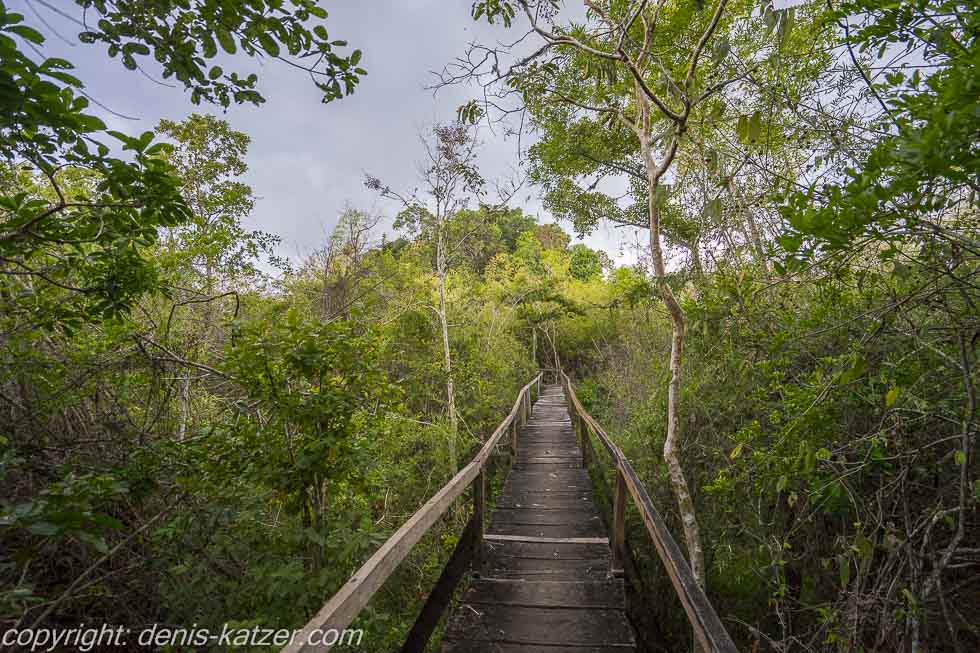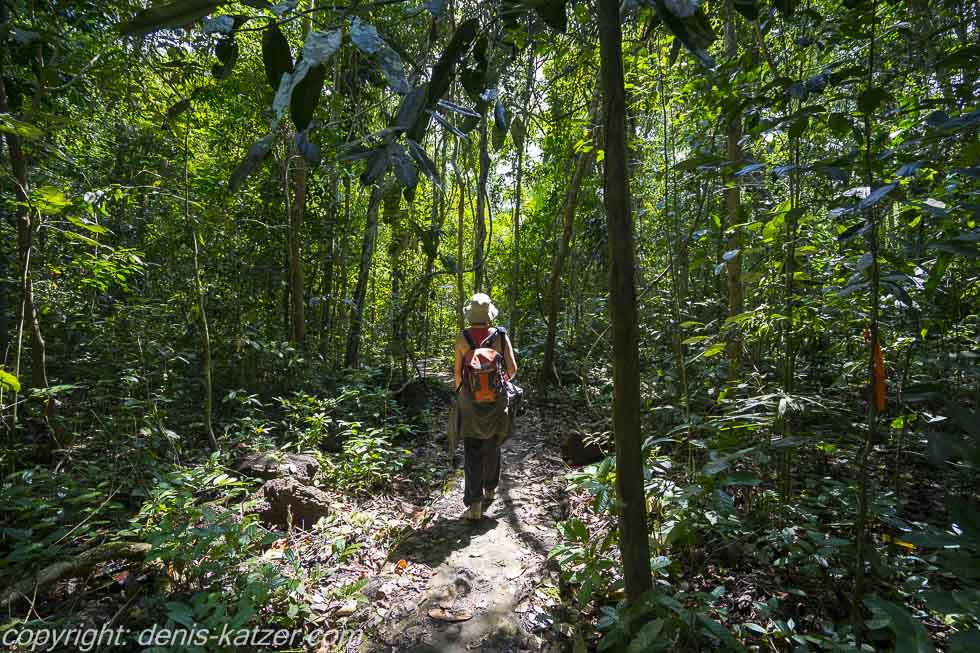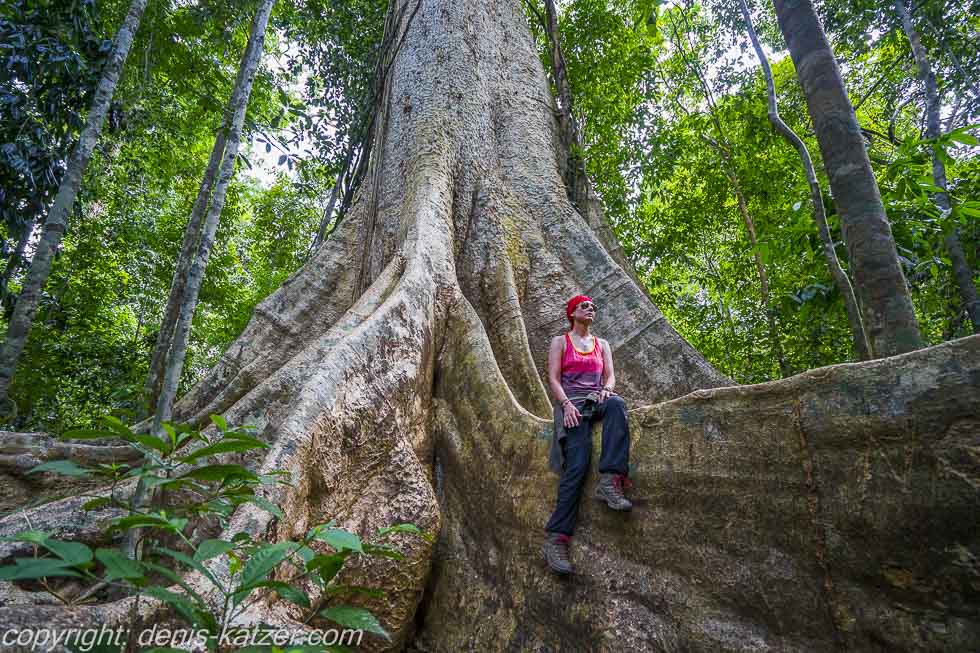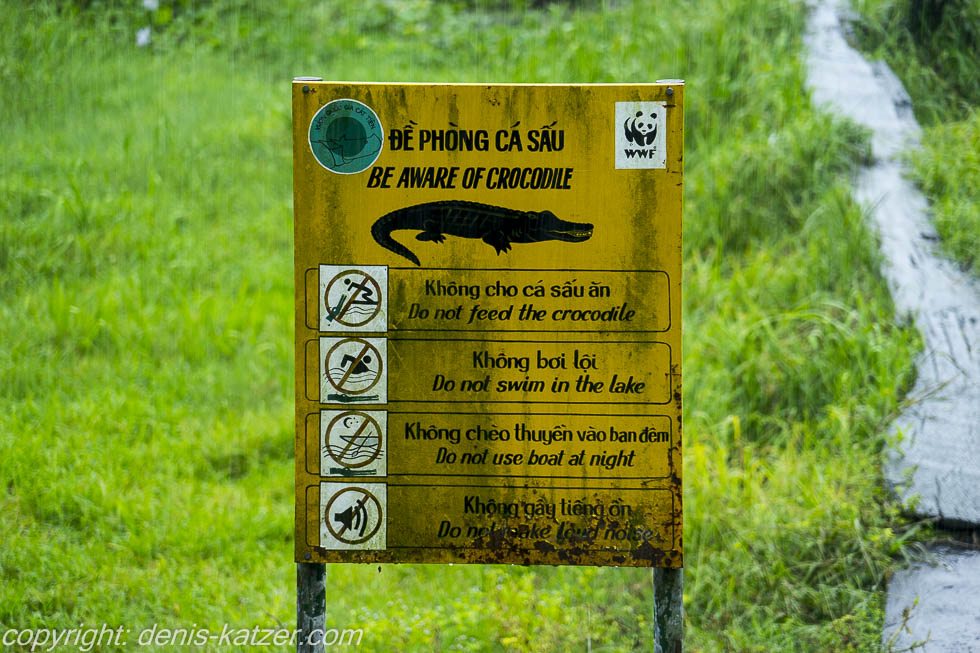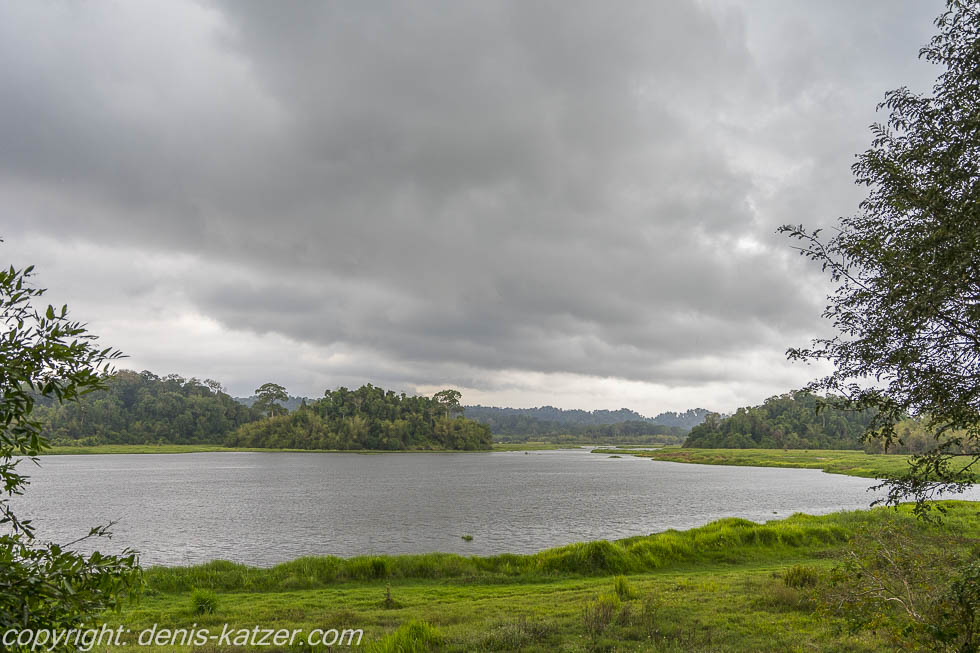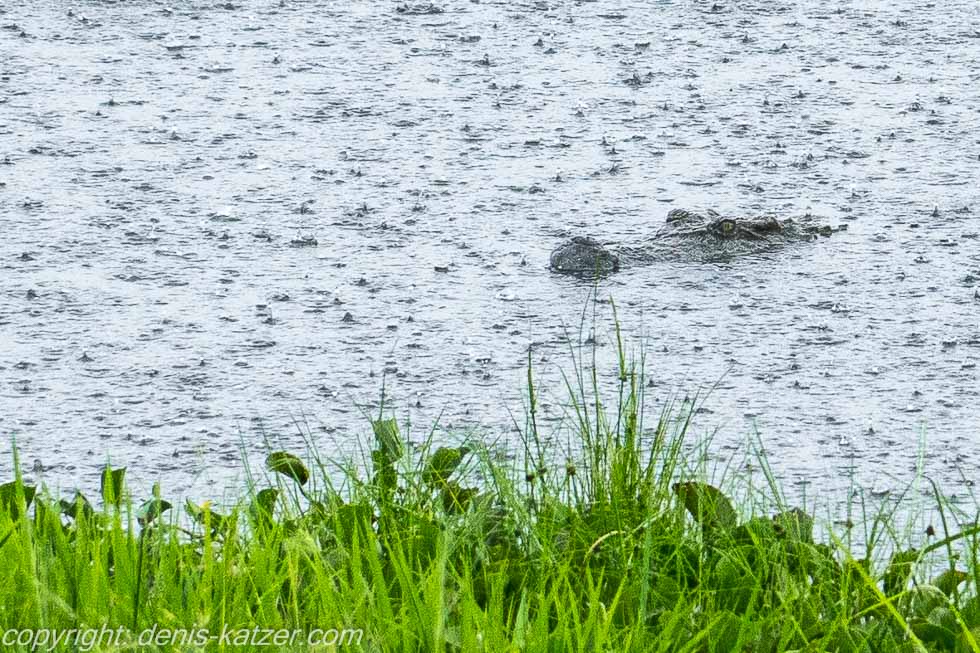
Crocodiles – Caught in the tropical jungle rain
N 11°25'15.9'' E 107°25'49.3''
Date:
15.03.2017 until 20.03.2017
Day: 624 – 629
Country:
Vietnam
Province:
Đồng Nai
Location:
Cat Tien National Park
Latitude N:
11°25’15.9”
Longitude E:
107°25’49.3”
Daily kilometers:
35 km
Total kilometers:
22,739 km
Soil condition:
Asphalt / gravel
Maximum height:
55 m
Total altitude meters:
68.623 m
Sunrise:
05:57 a.m. – 05:54 a.m.
Sunset:
6:00 pm – 6:01 pm
Temperature day max:
33°C
(Photos of the diary entry can be found at the end of the text).
Because we are staying in the national park much longer than planned, we sit down to plan our itinerary. We discover that, as originally assumed, there is no ferry connection between South Vietnam and Cambodia across the Gulf of Thailand. Although it would have been interesting to travel across the sea to the neighboring country, we abandon the idea and plan to cross into Cambodia from Vietnam’s southernmost border post, the town of Ha Tien. We cycle through Vietnam from north to south in just under a year. Because the boat passage doesn’t work out, we gain a few days which we use to get to know the interesting national park better.
As it is not allowed to enter the national park from our side of the river on our own bikes, we decided to hire two bikes from the national park administration to cycle to a lake where there are said to be lots of crocodiles. Because we don’t want to leave Ajaci alone in the room for too long, we don’t take the ferry to the national park until 11:30. We have to pay a deposit of 500,000 dong (€21) for the rickety bikes. “And where are the bikes?” I ask the cashier. “They’re all rented out. You’ll have to wait until the first ones are brought back.” As we assume that the Vietnamese don’t go on long tours, we decide to wait in the shade of a tree. In fact, the first tourists arrive at the administration building completely exhausted and drenched in sweat due to the heat. With a lot of effort I find two bikes on which the brakes work reasonably well. I raise the seat posts so that we don’t have to keep biting our knees while pedaling because the saddle is set too low. However, the frame size of the pedal bikes is adapted to the small Vietnamese, which is why we have the feeling that we are sitting on children’s bikes.
For the first two kilometers we follow a concrete path, then it gets rocky and bumpy. Just minutes later, the journey becomes a torture. No wonder the Vietnamese are not on the road for long. We have a ridiculous 10 kilometers ahead of us, which are tough because of the terrible bikes and the jungle path. “You can see how spoiled we are by our superbikes,” I say. “That’s right, you wouldn’t get very far on a round-the-world trip with these junkers.” “Either our bodies or the wheels would break down after a short time,” I’m sure.
When we reach the jungle path to the Bau Sau crocodile lake after 10 kilometers, we feel as if we have covered 140 km. “Fucking things,” I curse and lock the rickety bikes to a tree with a cable lock I’ve brought with me. As the sky is full of dark storm clouds, we hurry off to reach the crocodiles before the tropical rain that is sure to pelt down soon. “It’s unbelievable how loud the cicadas are here,” I realize. “Yes, you can hardly understand your own words.” “Should I make a sound recording with the camera?” “We’d better keep going. That way we might make it to the lake before the rain,” says Tanja. Every now and then we pass one of the gigantic jungle giants, which today has its crown in a threatening-looking cloudy sky. Butterflies sit on a stained stone that looks polished. A ray of light slips through the brief break in the clouds and hits the beautiful insects fluttering around excitedly. Suddenly, loud thunder shatters the chirping of the cicadas and the twittering of the birds. All the creatures fall silent for a few seconds, then they continue to make noise as if they had just been startled for a moment. The first raindrops fall from the sky. From the sound of it, the downpour is still a few hundred meters away. As its wetness hammers on the roof of the leaves, it rushes like a waterfall, which, however, comes inexorably closer. Our path leads onto a rickety, dilapidated wooden footbridge. A marshland spreads out below us. “I hope the rotten thing doesn’t collapse under our weight!” Tanja shouts as the first heavy raindrops hit us. As soon as we have hurried over the slippery wooden footbridge, we are once again surrounded by the now dark jungle. “Don’t think we’ll see any crocodiles in the lake in this terrible rain,” I shout to drown out the loud noise. Suddenly, another footbridge leads past a few huts, behind which the view of the idyllic Crocodile Lake opens up. Before the floodgates open completely and the land around us seems to be drowning, we slip under the protective corrugated iron roof of another simple wooden hut. I gaze intently at the water from our position. “Nothing. Not a single crocodile,” I say disappointedly. “They all seem to be hiding from the rain,” jokes Tanja. “Ha, ha, ha. You’d think so. But maybe there aren’t as many crocodiles as the park administration says?” I doubt it. “Yes, there are. We have at least 150 freshwater crocodiles here in the lake,” says a ranger who has just come out of the dark room of the wooden hut. “Ohhh, they’ve scared me now,” I cringe, because I didn’t expect to find a ranger here. “So that means that whoever goes swimming here will definitely be eaten?” I reply. “Definitely. Our crocodiles are now up to three meters long.” As soon as he confirms my question, a large fish suddenly shoots out of the water, followed by a crocodile. The crocodile’s mouth snaps shut while still in the air. The fish seems to escape at the very last second, as both water dwellers splash onto the surface separately and disappear. “Awesome!” I shout, immediately pulling my camera up and waiting to see if the spectacle repeats itself. “Everything’s calm,” says Tanja. “Yes, it must have been really lucky to see a flying crocodile,” I reply, still fascinated. “Is the size of the lake sufficient for a healthy population?” I ask the ranger. “Well, the freshwater crocodile lays about 40 eggs a year. Because of climate change, the lack of food and because the male crocodiles kill the younger ones, the reproduction rate is only about 40 percent.” “Why do the male crocodiles kill their young?” “Because they don’t want the females to spend too much time rearing their babies. In 2000, almost all the Siamese freshwater crocodiles living here were extinct due to illegal hunting. Despite all the difficulties, we have been very successful with our reintroduction project in the national park. I hope that with our work we can protect the future of the crocodiles living here. However, it is important that the national park continues to receive funding and has many guides.”
As it is already 3:30 pm and we have to walk at least an hour back to our bikes and then take another hour to cycle back to the administration center, we say goodbye to the friendly ranger. As soon as we leave the protective corrugated iron roof with two other visitors and their guide, we are soaked to the skin within seconds by the persistent tropical rain. We hurry over the partly slippery and slippery path. The cicadas have gone completely silent because of the heavy rain. The play of light and shadow has disappeared due to the lack of sunlight. The rain has knocked millions of leaves from the trees, which now lie above the path or to our left and right on the jungle floor. “A great experience!” exclaims Tanja. “What is a great experience?” “The rain. I’m soaking wet but it’s still not cold.” “Yes, and when the downpour is over, it won’t be long before we’re dry again,” I reply, remembering my earlier jungle expeditions to indigenous peoples, as we were constantly getting wet at that time.
Shortly before 5 p.m. we reach our bikes again, which, thank goodness, are still tied to the tree. The tropical rain has now moved on. “Phew, I really don’t feel like driving back over the bumpy and now muddy path,” says Tanja. “Me neither,” I agree with her. We find out that the young couple from Germany and their guide are being picked up by a pickup truck and ask them if they will take us to the administration center. “Sure, no problem,” says the guide. A little later, our junk bikes are stowed in the back of the pickup, so we enjoy a quick and comfortable ride back over a jungle track flooded with tropical rain. “And they rode their bikes from Germany all the way to Vietnam?” asks the passenger of the pickup, who, as luck would have it, is the director of the bear rescue center in Cat Tien National Park. It doesn’t take long and we are engrossed in an interesting conversation. “No, there are no more wild bears in Cat Tien. We only set up a few camera traps a few months ago and proved that conclusively.” “There certainly aren’t any more tigers either, are there?” “Ha, ha, ha. They were wiped out by poachers a long time ago.” “And what about the elephants? I heard there are still 25 of these magnificent animals living here.” “Yes, that’s true. But 25 years ago there were 75 elephants.” “And where did the 50 elephants disappear to?” “They were hunted by poachers.” “What, that’s still happening here? In the middle of the national park?” “Sure, we only have 100 rangers to protect the animals but tens of thousands of villagers, some of whom don’t care about the law. Traps are set everywhere to catch everything that creeps and flies to eat or sell. The people here are poor. Game is often the only way for them to get meat, at least occasionally. It’s hair-raising. Protecting our wildlife is a serious challenge. We need more support, more rangers, better weapons and more money, otherwise the poachers will win and more species will become extinct.” “I think your list is missing one of the most important wishes.” “Yes, which one?” “Less or even better no corruption. Because that is mainly responsible for this whole catastrophe. Nobody can tell me that you can catch an elephant unnoticed and then sell it unnoticed. Especially in a communist country where everything, even the internet, is monitored and people are locked up just for expressing their opinion. You don’t steal elephants unnoticed in a country like that. At least the local police chief, some of his staff, the local mayor and whatnot are behind it. They all get a cut of this business. It’s the only way to buy their collective silence. Otherwise, you would certainly talk about something as big as the capture of a wild elephant in a state-protected national park. They would need a mega anti-corruption weapon to blow the socks off all those involved in the crime against wildlife. Only then can they save the rest of their once great elephant herds.” “Ha, ha, ha. Well, there’s certainly some truth in that,” says the man and lapses into silence…
If you would like to find out more about our adventures, you can find our books under this link.
The live coverage is supported by the companies Gesat GmbH: www.gesat.com and roda computer GmbH http://roda-computer.com/ The satellite telephone Explorer 300 from Gesat and the rugged notebook Pegasus RP9 from Roda are the pillars of the transmission. Pegasus RP9 from Roda are the pillars of the transmission system.g.
